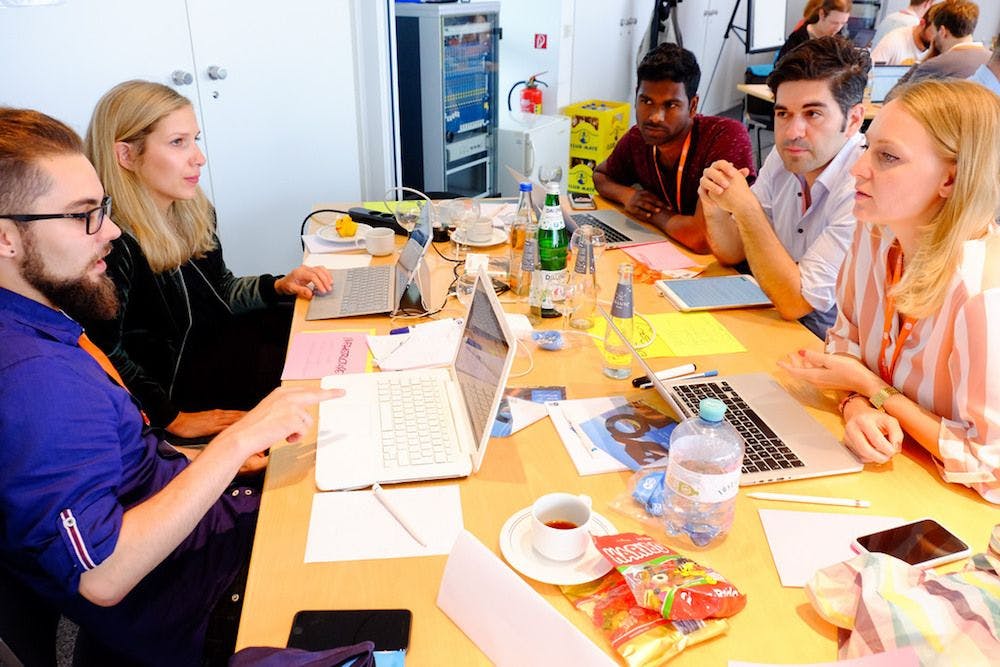Hackathon “Visualizing Global Inequalities”: Here’s what we came up with.
,79 bottles of Club-Mate, 30 hours of research and coding, 27 participants, six media institutions, three jurors, two outstanding AR concepts/prototypes, one outstanding DDJ tool, lots of great ideas, and one common goal: these are the key figures behind the hackathon we got to host in the scope of the DW Global Media Forum (GMF) earlier this month.
Invited by BBC News Labs, the GMF, and our team, journalists, project managers, and developers working for the BBC, Czech Radio (CR), DW, Hessischer Rundfunk (HR), Yle, and Swedish NGO Datastory gathered in Bonn from June 11th to June 13th to tackle the challenge of visualizing global inequalities in an innovative way: by applying augmented reality (AR) and data-driven journalism (DDJ) concepts and tech. The results of the two parallel tracks were impressive, and we've documented some of them in this post.
Project "Data Poverty", led by the BBC, won first place in the DDJ track. The app prototype does an excellent job in visualizing the fact that access to the web and digital news may be incredibly expensive depending on where you live. In the UK, it's a common thing to stream a documentary in HD and consume one gigabyte of data that way–but in Zimbabwe, that would cost you a staggering 35$–or 45% of your monthly income.
Another compelling DDJ project was the "Global Inequalities Quartet", created by Datastory, DW and HR staff. The team came up with a digital quartet (card game) that allows players to compare how different countries are doing in terms of social progress, i.e.: eradication of hunger, universal access to education, universal suffrage, freedom of the press, etc. The dark twist: The more terrible your hand, the better your chances at winning. You actually want to hold South Sudan and North Korea, not Norway and New Zealand.
CR and DW developers teamed up to build No Pain, No Gain?–which also falls under the DDJ/serious games hybrid category, but follows a different approach. Inspired by the arduous mechanics of 8 bit classics like Summer Games, the app allows users to find out what kind of purchasing power they have as a medium skilled assembly line worker somewhere in the European Union–or in Nigeria, for example. In some places, you have to tighten a lot of bolts just to afford a little snack.
DDJ project "Tweets Monitor", put together by a BBC and DW team, uses DDJ tools to scrape and parse the Twitter feeds of a multitude of news organizations. The goal: analyze covered topics and entities–and uncover imbalance in our 'media diet', agenda setting, or bias that way.
In the AR track, first place went to "Hidden Stories". Created by a mixed Datastory and DW team, the prototype app uses an in-situ augmented reality journalism approach to visualize global inequalities. Users hold up their phones (or tablets) and get a new perspective on everyday objects. In the demo, the story revolves around packaged water and two people's relation to it: For Gisela from Germany, packaged water is a cheap commodity that's not essential for her well-being. For Tumo from Tanzania, it's a potential lifesaver he can barely afford.
AR project “Match on Map”, which secured the honorable mention award, also follows a gaming approach. Creators DW and Yle invite users to hold their smart devices over a physical (paper) map of the world, face demographic questions — and collaboratively answer them by placing virtual bar charts on countries or continents. After everybody has placed their “bet”, the phone or tablet reveals the correct answer, either confirming guesses or giving users new insights.
Needless to say, all ideas presented at the hackathon were really interesting and deserve further development. Fingers crossed, participants will get the chance to continue working on their projects soon–and at the latest when we convene for another hackathon.
Once again, we'd like to say thank you to everybody who joined us in Bonn. It was a truly inspiring event that demonstrated the power of international, interdisciplinary cooperation in the field of digital journalism. A special thanks goes out to our great jury (the impartial @debarati_guha, @evopez, and @samdubberley) and all helping hands (too many to mention by name).
And a final positive message: All winners decided to donate their prize money to Heifer International and their female education and empowerment program: We'll send four girls to school!
Hackathon photo by Ruben Bouwmeester. Screenshots/Videos by the hackathon teams.
For more impressions of the event, check out our album on flickr.
